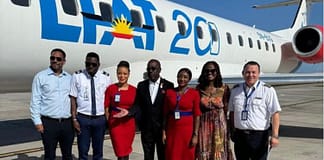
At the opening of the First Global Ministerial Conference on Ending Violence Against Children, Dr. Jarbas Barbosa, Director of the Pan American Health Organization (PAHO), made an urgent call to action to address violence against children, adolescents, and youth in the Americas.
“The Americas face the greatest challenge, but we are also the ones who understand this issue best,” highlighted the PAHO Director. “The recent COVID-19 pandemic has only reinforced the urgency to act,” he added, underlining the need for immediate and effective solutions.
Dr. Barbosa emphasized the importance of multisectoral collaboration and evidence-based interventions to address this public health problem, which not only affects individuals and communities but also has significant consequences for sustainable development and the economies of countries.
“Globally, one in two children and adolescents aged 2 to 17 years experience some form of violence each year. This violence takes many forms, all equally unacceptable and with enormous consequences,” stated Dr. Barbosa. “The Americas has the highest homicide rate in the world for those under 18 years of age, more than three times the global average (5.8 per 100,000, compared to the global rate of 1.7),” he added.
When it comes to adolescent girls, the PAHO Director noted that globally, one in four girls aged 15 to 19 has experienced intimate partner violence before turning 20. “Sexual violence and early and forced unions are challenges that cannot wait to be addressed. We must act urgently to break this cycle of violence,” he said.
“By the end of today alone, more than 200 children, adolescents, and youth (up to 29 years old) will have died of homicide in the Americas,” he stated. “This Region is infamous for having the highest homicide rate in the world, especially among young males, a high acceptance of corporal punishment, and gun violence in our schools and streets,” he added.
Dr. Barbosa underscored that evidence suggests that changes in social norms that discourage violence can be achieved. “By raising awareness and creating safeguards, we can reduce the number of children who witness violence in their homes or schools, and help prevent future cycles of violence,” he stated.
The conference in Bogotá represents a milestone in the collective fight against violence against children, as representatives from various nations gather to share knowledge and commit to concrete solutions. The conference will drive policy changes, mobilize resources and demonstrate that violence prevention is possible.

The PAHO Director expressed his gratitude to Colombia for hosting the event and highlighted the ongoing work of PAHO in strengthening health systems to support survivors and promote policy changes that protect communities. “The health sector has a key role in early detection and supporting survivors,” he commented.
“We have the solutions to prevent violence; this is the time to act,” he declared. “We must focus on what we know works: evidence-based interventions that are proven to have real impact.” In this regard, he highlighted the importance of the INSPIRE framework, which outlines seven evidence-based strategies to end violence against children and adolescents, ranging from strengthening laws and policies to changing social norms and providing care for survivors.
The conference will launch new initiatives, such as the WHO’s ‘Childhood without Violence’ campaign to expand the reach of INSPIRE. This is the first anti-violence movement led by children and adolescents. It will also result in a political declaration to consolidate the commitments made.
Dr. Barbosa also emphasized the importance of addressing the underlying social causes of violence, such as poverty, inequality, and discrimination. “We cannot address violence without paying attention to social inequalities, including migration, ethnicity, disability, and socioeconomic status. We have a collective responsibility to respond first to those furthest behind,” he stated.
In this context, the PAHO Director reaffirmed the Organization’s commitment to collaborating with governments and organizations to implement effective strategies and ensure that children, adolescents, and youth, including survivors and vulnerable communities, are involved in the design of solutions.
“I am personally committed to giving visibility to this issue and supporting innovative solutions to ensure that this conference leads to real change,” Dr. Barbosa emphasized. “Together, we can ensure that children, adolescents, and youth live long, happy, healthy, and violence-free lives.”
###
About the First Global Ministerial Conference on Ending Violence Against Children
The First Global Ministerial Conference on Ending Violence Against Children, convened by the Government of Colombia with the support of the Government of Sweden, UNICEF, the Special Representative of the United Nations Secretary-General on Violence against Children, and the World Health Organization (WHO), seeks to drive policy change, mobilize resources, and demonstrate that violence prevention is possible. Ministerial delegations, along with children, young people, survivors, and civil society allies, will unite around a shared and bold commitment to end all forms of violence against children. Half of all children globally — close to 1 billion — suffer some kind of violence, whether at home, at school, in the community or online, including physical punishment, bullying, and emotional and sexual abuse.
About PAHO’s work towards ending child violence
PAHO works closely with its Member States and other stakeholders to prevent and respond to violence against children, adolescents, and youth in the Americas. Its priorities include raising awareness of the need to adopt effective measures to reduce violence in the region, identifying and disseminating evidence-based good practices, and providing technical support to countries to strengthen their prevention and response capacities. PAHO also works on training health personnel, developing clinical protocols, and collecting data to improve the health system’s response to violence. The organization also promotes intersectoral partnerships to carry out coordinated actions and address the multiple forms of violence affecting children in the region.
Advertise with the mоѕt vіѕіtеd nеwѕ ѕіtе іn Antigua!
We offer fully customizable and flexible digital marketing packages.
Contact us at [email protected]
















